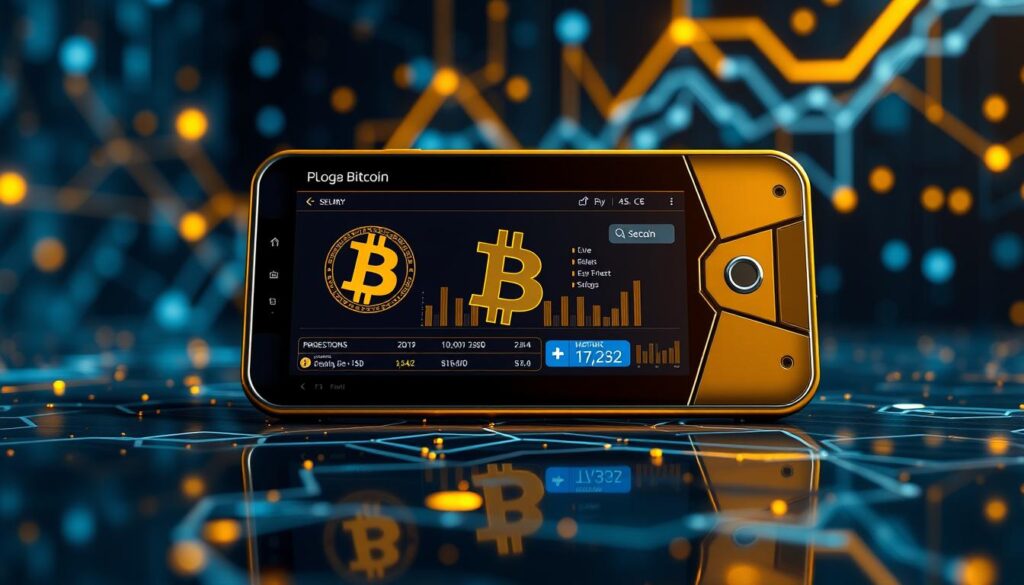Did you know there are over 300 million Bitcoin wallets worldwide? This shows how popular the first digital currency has become. Whether you’re new to investing or already know a thing or two, buying Bitcoin can change your financial life.
This guide will show you how to buy Bitcoin step by step. We’ll cover the basics and help you pick the best exchange and wallet. By the end, you’ll know how to invest in Bitcoin and take charge of your money.
Key Takeaways
- Bitcoin can be bought on many platforms, like exchanges, brokerages, and peer-to-peer sites.
- You can start investing in Bitcoin with just $30, making it easy for beginners.
- Popular exchanges like Binance, Coinbase, and OKX accept many payment methods, including credit cards and PayPal.
- It’s important to know the difference between market and limit orders when buying Bitcoin for the first time.
- Fees can differ a lot, with credit card payments usually costing more.
Understanding Bitcoin: A Digital Currency
Bitcoin has caught the eye of many, from investors to fans. It’s a digital currency that doesn’t need a central authority like banks or governments. The tech behind it, called blockchain technology, is secure and open. It keeps track of all transactions.
What is Bitcoin?
Bitcoin is a cryptocurrency fundamentals. It’s digital money you can use to buy things or exchange for real money. It’s not backed by governments or banks. Instead, it’s supported by computers (nodes) that check and record all transactions on the blockchain.
How Does Bitcoin Work?
- Bitcoin runs on blockchain technology. It’s a digital ledger that keeps track of all transactions.
- Users send and receive Bitcoins using digital wallets. These can be on computers, phones, or special devices.
- Transactions are checked by network nodes and added to a public ledger called a blockchain. It can’t be changed.
- New Bitcoins are made through mining. Computers solve hard math problems to verify transactions and get new Bitcoins.
The Bitcoin basics are about its decentralized nature, openness, and cryptography for security. As Bitcoin grows, it’s key for investors and users to grasp its unique aspects and how it works as digital currency.
“Bitcoin is a technological tour de force.”
– Bill Gates, Co-founder of Microsoft
Choosing the Right Bitcoin Wallet
Choosing the right Bitcoin wallet is key to keeping your crypto safe. There are two main types: hot wallets and cold wallets. Knowing the difference helps you pick the best one for your security and trading style.
Types of Bitcoin Wallets
Hot wallets are online, making transactions quick and easy. They include mobile apps, desktop apps, and web wallets. Cold wallets, like hardware or paper wallets, stay offline. They’re safer for big amounts of Bitcoin.
Security Features to Consider
- Strong passwords and two-factor authentication are must-haves for your Bitcoin wallet.
- Cold wallets, like hardware ones, have extra security. They’re not online and have seed phrase backups.
- Hot wallets are online, so they’re riskier. But, they’re better for quick Bitcoin transactions.
How to Set Up Your Wallet
Setting up your Bitcoin wallet needs careful following of the provider’s steps. This includes making a strong password, enabling two-factor authentication, and keeping your seed phrase safe. Coinbase, Kraken, and Gemini give detailed help for a secure setup.

“Properly securing your Bitcoin wallet is essential to protecting your digital assets. Take the time to understand the features and risks of hot and cold wallets to make an informed choice that aligns with your Bitcoin storage needs.”
Finding a Reputable Bitcoin Exchange
Choosing the right Bitcoin exchange is key when buying and trading Bitcoin. The United States has many top exchanges for all types of traders. Coinbase, Kraken, Gemini, and Binance are some of the best options.
Top Exchanges to Consider
- Coinbase – It’s easy to use and offers over 240 cryptocurrencies. It’s great for beginners.
- Kraken – It has advanced features and supports over 300 cryptocurrencies. It’s best for experienced traders.
- Gemini – It focuses on security and has around 70 cryptocurrencies. It’s a trusted choice for traders.
- Binance – It has over 600 cryptocurrencies and is easy to use. It’s known for its large selection and liquidity.
Comparing Fees and Features
When picking a Bitcoin exchange, look at the fees and features. Coinbase and Gemini charge between 0.5% and 3.99%. Kraken and Crypto.com start at 0.16%. Robinhood Crypto has no trading fees but charges through spreads.
| Exchange | Trading Fees | Cryptocurrencies Offered | Notable Features |
|---|---|---|---|
| Coinbase | 0% – 3.99% | Over 240 | Beginner-friendly, secure crypto storage |
| Kraken | 0.16% – 5% | Over 300 | Advanced trading options, low fees |
| Gemini | 0.5% – 3.49% | Over 70 | Focus on security and compliance |
| Binance | 0% – 2.99% | Over 600 | Vast selection of cryptocurrencies, user-friendly |
Think about fees, cryptocurrency options, and special features when choosing a Bitcoin exchange. This will help you find the best fit for your needs and investment plan.
How to Create Your Account on an Exchange
To buy Bitcoin or other cryptocurrencies, you need to create an account on a cryptocurrency exchange. This involves verifying your identity through a Know Your Customer (KYC) procedure. It’s important to do this to keep your account safe and follow anti-money laundering rules.
Verification Process Explained
The verification process is like setting up a traditional brokerage account. You’ll need to provide personal identification documents, like a driver’s license or Social Security card. You might also have to share information about your job and where your money comes from. This is all part of the KYC process to confirm who you are and stop fraud.
Setting Up Two-Factor Authentication
Setting up two-factor authentication (2FA) is key to securing your account. It adds an extra layer of protection against unauthorized access. With 2FA, you get a one-time code via SMS, email, or an app. You’ll need this code, along with your password, to log in.
By going through the verification process and enabling 2FA, you keep your cryptocurrency investments safe. You protect your account from threats like hacking or identity theft.

Funding Your Exchange Account
Many beginners wonder how to fund their exchange account to buy Bitcoin. Luckily, most crypto exchanges offer many deposit methods. This lets you pick the best option for you.
Deposit Methods Available
Here are the top deposit methods:
- Bank Transfers: You can link your bank account for easy deposits. Bank transfers are usually cheaper, but some banks might block them.
- Credit/Debit Card Purchases: You can also use cards for quick deposits. But, expect to pay more fees than with bank transfers.
Currency Options for Deposits
You can usually deposit in US dollars (USD) or other currencies. Some exchanges even accept Bitcoin or Ethereum. The options depend on the exchange you pick.
Always check the fees and processing times. This ensures a smooth and affordable way to buy Bitcoin.
“Bitcoin was trading closer to $20,000 in early 2023, but many predict it will cross the six-figure mark before the end of the year.”
Making Your First Bitcoin Purchase
When you buy Bitcoin, you can choose between market orders and limit orders. A market order lets you buy Bitcoin at the current price, making it quick. A limit order lets you set a price you want to pay, which might be better.
Cryptocurrency exchanges like Coinbase let you invest in Bitcoin regularly. You can set up daily, weekly, or monthly buys. Plus, you can buy fractions of Bitcoin, starting at just $10.
Placing a Market Order vs. Limit Order
Choosing between a market order and a limit order depends on your strategy and how much risk you’re willing to take. Market orders are fast but might cost more. Limit orders aim for a specific price but might not be filled if the market doesn’t meet it.
Understanding Bitcoin Amounts
You don’t have to buy a whole Bitcoin. Bitcoin can be split into smaller units called satoshis. One Bitcoin equals 100 million satoshis. This makes it easier for those with smaller budgets to invest.
Remember, even a small amount of Bitcoin can be risky because of its price changes. Always do your research and understand the risks before investing.
| Bitcoin Trading Options | Market Order | Limit Order |
|---|---|---|
| Execution Speed | Immediate | Delayed |
| Price Certainty | Uncertain | Certain |
| Recommended Use | Urgent purchases | Targeted price acquisitions |

“Investing in Bitcoin is not for the faint of heart. It’s a highly volatile asset that requires careful research and risk management.”
Safe Storage of Your Bitcoin
Keeping your Bitcoin safe is key, after you buy it. Moving your Bitcoin to a personal wallet is a good idea. This way, you have more control and protection over your private keys.
Moving Bitcoins to Your Wallet
When you move Bitcoin, make sure to check the recipient address twice. Sending it to the wrong address can mean losing your money forever. Once it’s in your wallet, you can be sure your Bitcoin is safe with you.
Best Practices for Secure Storage
- Cold Storage Wallets: Hardware wallets like Ledger or Trezor are the safest for keeping Bitcoin long-term. They keep your private keys offline, safe from online threats.
- Multiple Addresses: Spreading your Bitcoin across many addresses makes it safer. It lessens the risk of losing everything if one address is compromised.
- Backup Your Seed Phrase: Your wallet’s seed phrase is vital for getting back into your Bitcoin if you lose your device. Keep it safe, like in a fireproof safe or a safety deposit box.
- Avoid Sharing Private Keys: Never give out your private keys. Doing so lets someone else control your Bitcoin. Keep this info safe to prevent unauthorized access.
Following these secure storage tips can help protect your Bitcoin. The right security level depends on how much Bitcoin you have and how much risk you’re willing to take.
“In 2021, an estimated $14 billion worth of crypto was stolen, highlighting the importance of secure storage practices.”
Staying Informed: Keeping Up with Bitcoin Trends
To stay ahead in the world of Bitcoin and cryptocurrency, you need reliable tools and news. By watching Bitcoin price charts and news, you can make smart choices. This keeps you in the loop with the latest trends.
Market Analysis Tools
Websites like CoinMarketCap and TradingView give you real-time Bitcoin price charts and market data. They help you see how Bitcoin and other cryptocurrencies are doing. These tools show you trading volumes, market size, and price changes. This helps you spot trends and make smart investment choices.
Reliable News Sources for Bitcoin
- For the best cryptocurrency news and deep analysis, check out CoinDesk, Cointelegraph, and Bitcoin Magazine.
- These trusted sources cover a lot, like regulatory news, industry updates, and expert opinions. They help you stay current with market analysis and trends.
- It’s key to check different sources to get a full view. Don’t just rely on one.
By keeping up with Bitcoin price charts, cryptocurrency news, and market analysis, you can navigate the Bitcoin world better. This helps you make informed decisions about your investments.

Understanding Bitcoin Taxes
Bitcoin’s popularity is growing fast. It’s important for investors and fans to know about taxes. In the U.S., the IRS treats Bitcoin like property, not money. So, any profit or loss from Bitcoin is taxed as capital gains.
Tax Implications in the United States
When you sell Bitcoin for more than you bought it for, you make a capital gain. This gain is taxed. The tax rate depends on how long you had the Bitcoin. If it was less than a year, you pay income tax rates, from 10% to 37%. For more than a year, the rate is lower, between 0% and 20%.
Record-Keeping for Bitcoin Transactions
- It’s key to track the cost basis of your Bitcoin purchases for capital gains and losses.
- Keep detailed records of all Bitcoin transactions, like date, amount, and price.
- Crypto exchanges must report fair market value to the IRS. Make sure your records match theirs.
- Using crypto tax software, like CoinTracker, can help track and report your Bitcoin transactions.
Not reporting cryptocurrency taxes, like Bitcoin tax reporting, can lead to fines and penalties from the IRS regulations. It’s vital to stay updated and keep accurate records to follow tax laws.
| Tax Scenario | Tax Rate |
|---|---|
| Short-term capital gains (less than 1 year) | 10% to 37% |
| Long-term capital gains (more than 1 year) | 0% to 20% |
Knowing the Risks of Bitcoin Investment
Investing in Bitcoin can be thrilling and rewarding, but it also has big risks. The Bitcoin market is very volatile. This means the price can change a lot, quickly. You might see big gains or losses in a short time.
Market Volatility Explained
Bitcoin’s value has changed a lot in recent years. In 2021, it hit a record high of over $56,000. Then, it dropped nearly 11% in one day. The whole cryptocurrency market lost over $2 trillion in 2022. This shows how risky investing in digital assets can be.
Common Scams to Avoid
- Phishing Attempts: Scammers might try to get your private keys or seed phrases. This could lead to your Bitcoin being stolen.
- Fake Exchanges: Some fake exchanges promise high returns but take your money. Always check an exchange’s reputation before using it.
- Ponzi Schemes: Some projects are just Ponzi schemes. They use new investors’ money to pay off earlier ones.
To avoid these risks, only invest what you can afford to lose. Spread your investments and never share your private info. Also, keep up with the latest in the cryptocurrency world. Getting advice from trusted sources can help you make better choices.

“Cryptocurrency investment carries significant risks, and it’s essential to thoroughly understand the market before making any investments.” – Financial Advisor
Knowing the risks and taking steps to protect your investments can help you succeed in the Bitcoin world. It’s all about being smart and cautious.
Planning Your Long-Term Bitcoin Strategy
As a beginner investor, it’s key to think long-term with Bitcoin. Bitcoin has shown big price growth over time. This makes it a great choice for those willing to hold onto it for a while.
Investment Strategies for Beginners
Dollar-cost averaging is a popular strategy for newbies. It means investing a set amount regularly, not all at once. This method helps you build your Bitcoin slowly and lessens the risk of buying at the wrong time.
The buy-and-hold strategy has worked well for many. Holding onto Bitcoin for the long run can help you grow your investment, even with market ups and downs.
Diversifying Your Crypto Portfolio
- While Bitcoin is big and well-known, adding other cryptocurrencies to your portfolio can spread out your risk.
- Try to put 80% of your crypto money into Bitcoin and 20% into other coins like Ethereum or Litecoin.
- This mix gives you a chance to see how the whole crypto market does while keeping a big chunk in Bitcoin.
Your investment plan should match your financial goals and how much risk you’re okay with. It’s important to do your homework, keep up with Bitcoin and crypto news, and maybe talk to a financial advisor.
“Investing in Bitcoin for the long term is like a game of patience. The key is to stay disciplined and trust the process, even when the market gets volatile.”
– Cathie Wood, ARK Invest Founder and CEO
| Investment Strategy | Pros | Cons |
|---|---|---|
| Dollar-Cost Averaging | Mitigates market timing risk, helps build holdings gradually | Slower growth compared to investing all at once |
| Buy-and-Hold | Leverages Bitcoin’s long-term growth, less emotional | Needs patience and discipline during market ups and downs |
| Diversified Portfolio | Spreads risk across different cryptocurrencies, could lead to higher returns | Requires more research and watching of multiple assets |
Resources for Further Learning
To learn more about Bitcoin and cryptocurrency, there are many resources to check out. Reading books on the subject can give you a deep dive into the technology and its history. You’ll also learn about its wide-ranging effects on finance.
Recommended Books on Bitcoin
Start with books like “The Bitcoin Standard” by Saifedean Ammous or “Mastering Bitcoin” by Andreas M. Antonopoulos. These books explore Bitcoin’s technical side, its economic rules, and its possible impact on money.
Online Courses and Tutorials
Online platforms like Coursera and edX have courses and tutorials on blockchain and cryptocurrency. They’re perfect for beginners or those wanting to grow their knowledge. Bitcoin.org also offers free resources to help you start.
Getting involved in online forums and communities is also smart. It lets you learn from others and keep up with the latest in cryptocurrency.
FAQ
How can I buy Bitcoin?
You can buy Bitcoin through many ways. This includes cryptocurrency exchanges, traditional stockbrokers, and money transfer apps. You can also use Bitcoin ATMs or Bitcoin ETFs. Bitcoin can be bought in small amounts, starting at .
What is Bitcoin and how does it work?
Bitcoin is a digital currency made with special computer tech called blockchain. It doesn’t need a bank to work. It was made for payments and is traded on public exchanges.
What types of Bitcoin wallets are available?
There are two main types of Bitcoin wallets. Hot wallets are online and fast. Cold wallets are offline and safer but slower.
Which Bitcoin exchanges are popular in the United States?
In the U.S., popular exchanges include Coinbase, Kraken, Gemini, and Binance. These places offer many cryptocurrencies and ways to exchange them for money.
What is the verification process for creating a cryptocurrency exchange account?
To make an account, you need to show your ID. This is because of rules called Know Your Client (KYC). You might need to show a driver’s license or Social Security card, and tell about your job and money sources.
How can I fund my Bitcoin exchange account?
You can fund your account by linking your bank or using a card. Bank transfers are usually cheaper. But, using a card might cost more.
How do I purchase Bitcoin on an exchange?
To buy Bitcoin, you can use market orders or limit orders. Market orders buy at the current price. Limit orders buy at a set price. Some sites let you set up regular buys.
How should I store my Bitcoin for maximum security?
After buying, move your Bitcoin to a personal wallet for safety. The safest way is cold storage, like hardware wallets, for long-term keeping.
Where can I find reliable information about Bitcoin?
For reliable info, use tools like CoinMarketCap and TradingView. They have real-time charts and data. News sites like CoinDesk, Cointelegraph, and Bitcoin Magazine also offer updates and analysis.
What are the tax implications of buying and selling Bitcoin?
In the U.S., Bitcoin is taxed like property. So, you’ll pay capital gains tax on sales. Keep detailed records for tax time.
What are the risks associated with Bitcoin investment?
Bitcoin is risky because of its price swings. Prices can change a lot, fast. Watch out for scams like phishing and fake exchanges.
How can I develop a long-term Bitcoin investment strategy?
Start with dollar-cost averaging. Invest small amounts regularly. Diversify by investing in other cryptocurrencies. Always match your strategy to your goals and risk level.
Where can I learn more about Bitcoin and blockchain technology?
Learn more with books like “The Bitcoin Standard” and “Mastering Bitcoin”. Online courses on Coursera and edX cover blockchain. Bitcoin.org has free resources for beginners.


















